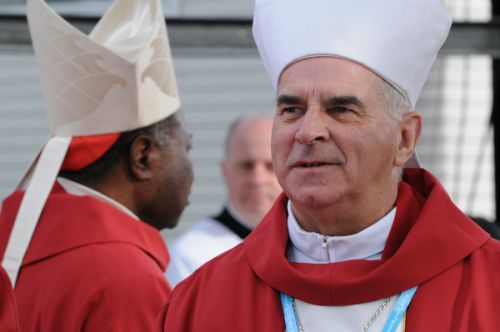In a rare move, Pope Francis accepted the resignation of disgraced Scottish Cardinal Keith Patrick O'Brien from the rights and duties of a cardinal, the Vatican announced on Friday. “As most people are aware, Pope Francis is a good and prayerful man whose character embodies justice and mercy. I am confident therefore that the decision of the Holy Father is fair, equitable and proportionate,” Archbishop Leo Cushley of Saint Andrews and Edinburgh in a March 20 statement. “Cardinal O'Brien’s behaviour distressed many, demoralised faithful Catholics and made the Church less credible to those who are not Catholic. I therefore acknowledge and welcome his apology to those affected by his behaviour and also to the people of Scotland, especially the Catholic community.” Cardinal O'Brien stood down as Archbishop of St. Andrews and Edinburgh in March 2013 at the age of 74 amid media claims of inappropriate sexual behaviour with other men which allegedly took place in the 1980s. After the claims surfaced that February, the cardinal's request for retirement — originally submitted to Benedict XVI in November 2012 for reasons due to age and health — was accepted immediately by Benedict, going into effect Feb. 25. O’Brien subsequently admitted that “there have been times that my sexual conduct has fallen below the standards expected of me as a priest, archbishop and cardinal.” Following today’s announcement by the Vatican, Cardinal O'Brien will now remove himself from the key duties that pertain to the office of cardinal: the election of any future Pope and the assistance of the Holy Father in the governance of the Universal Church. He will also be reduced to a strictly private life with no further participation in any public, religious or civil events. Only a Pope can approve a cardinal resigning his official status, and today's announcement is extremely rare in Church history. The closest parallel to today's events came in 1927 when French Cardinal Louis Billot resigned from the Sacred College of Cardinals following a stormy meeting with Pope Pius XI. His resignation was accepted by the Pope eight days later. The ruling by Pope Francis stems from his decision last year to send a personal envoy, Maltese Archbishop Charles Scicluna, on a fact-finding mission to Scotland. It is upon that investigation — the content of which is fully know only to Pope Francis and Archbishop Scicluna — that Francis reached his canonical conclusion. Cardinal O'Brien's decision followed a private discussion with Pope Francis. This was preceded by a period of prayer and penance. “For my own part, I would like to express sorrow and regret to those most distressed by the actions of my predecessor,” added Archbishop Cushley, who was nominated by Pope Francis in July 2013, shortly after his election to the papacy. “I hope now that all of us affected by this sad and regrettable episode will embrace a spirit of forgiveness, the only spirit that can heal any bitterness and hurt that still remains.”

